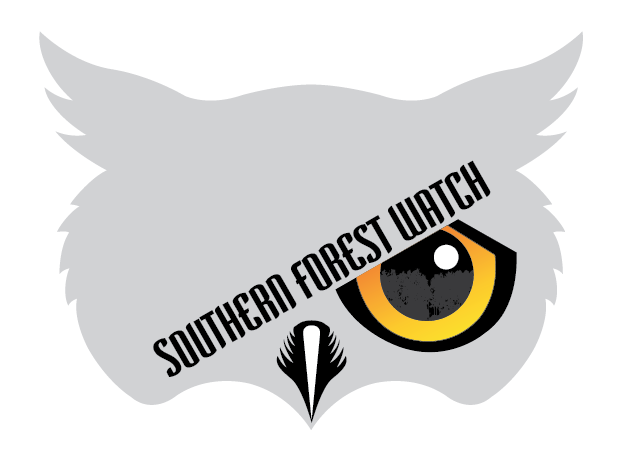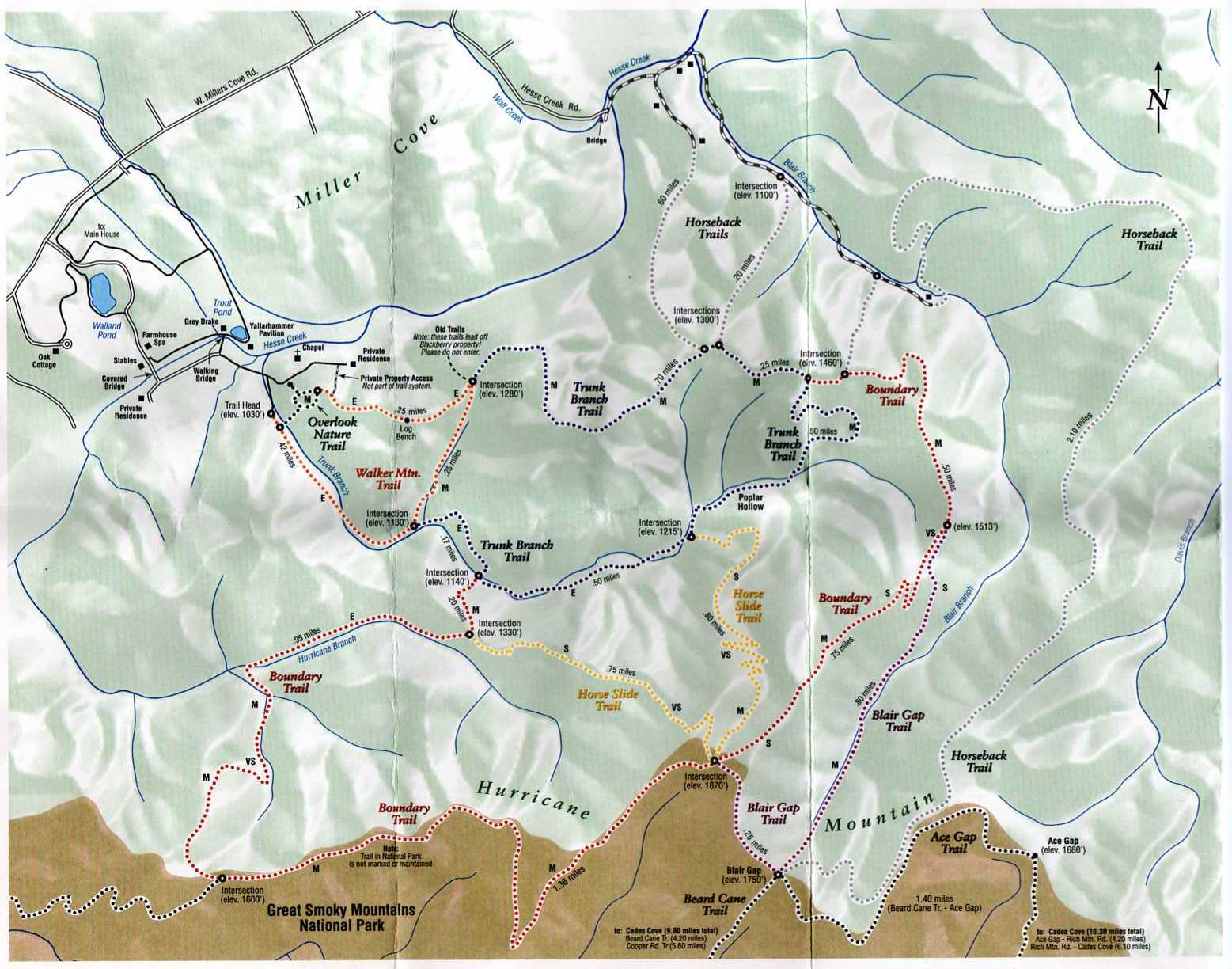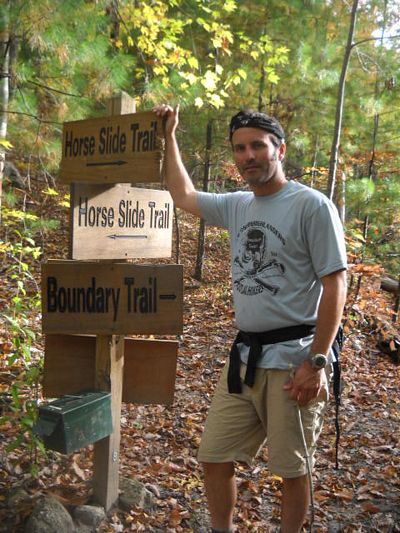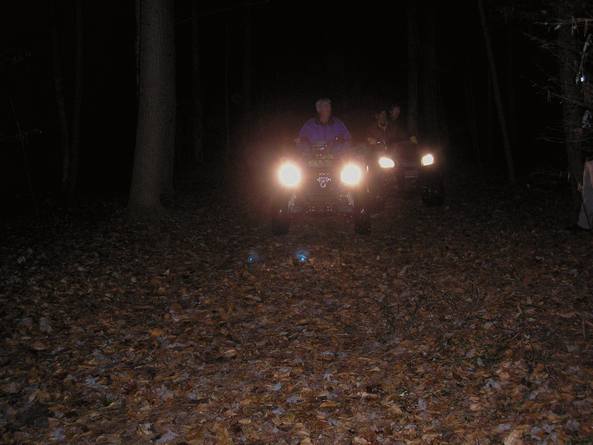

LAWSUIT FOUND HERE CLICK FOR DETAILS
National Parks Traveler Article
WATE Coverage SFW threatens legal action
Breaking News | The Daily Times - Southern Forest Watch considers backcountry fee lawsuit
Backcountry Tax: Charging Backpackers to Camp is Against the Spirit of the Smokies » Metro Pulse
The Following documents are related to the letter prepared on behalf of Southern Forest Watch by Myers Morton, legal counsel. This letter and it's enclosures are forwarded to all relevant parties to include the National Park Service, Department of Interior, Congressional Representatives and Senators from Tennessee and North Carolina. AUGUST 28, 2012 www.southernforestwatch.org
click link below to access the formal complaint to the NPS
SFW LETTER TO DITMANSON, NPS, DOI REGARDING BACKCOUNTRY FEE

This is a map provided, presumably by Blackberry Farms.
 TRAIL SIGNS
ERECTED, PRESUMABLY, BY BLACKBERRY FARMS
TRAIL SIGNS
ERECTED, PRESUMABLY, BY BLACKBERRY FARMS
 Picture of Blackberry Farms ATV incursion with chainsaws into campsite 2 via
Cane Creek.
Picture of Blackberry Farms ATV incursion with chainsaws into campsite 2 via
Cane Creek.
(The enclosed document is a summary of the meeting between Southern Forest Watch and Smokies Leadership. Notes were taken by Melissa Cobern, NPS backcountry specialist and a copy was requested by the Southern Forest Watch.)
Below are the two disparate versions of the meeting between the Southern Forest Watch and Ditmanson's staff. First Version is the NPS version, second is the SFW version
Meeting with Local Backpackers Regarding Backcountry Fee Proposal
May 31, 2012 GRSM Headquarters Conference Room
Attendees: John Quillen, Frank Whitehead, Mike McMurray, Gregg Bostick, Rob Cameron, Jim Casada, Adam Beal, Dale Ditmanson (GRSM Superintendent), Kevin Fitzgerald (GRSM Deputy Superintendent), Clay Jordan (GRSM Chief Ranger) and Melissa Cobern (GRSM Backcountry Management Specialist.
Background: At the request of Frank Whitehead, a meeting between NPS officials and a group of local backpackers was held to discuss backpacker concerns in relation to the Backcountry Fee Proposal.
Proceedings:
The meeting began at 10:00 am. Dale welcomed the backpacker group (BG). The BG expressed appreciation to Dale for the meeting and immediately began to express their concerns related to the Backcountry proposal.
The following is a summary of concerns expressed and questions asked by the BG during the meeting. Text in italics is a synopsis of the related discussion.
Fee for AT Thru Hikers
BG concerned that AT hikers are getting a special deal--$20 for through hikers to have seven days to get through the park is unfair, as others using the backcountry for that length of time would pay more.
An AT Working Group has
discussed a permit that would allow AT thru hikers seven days to get through the
park for a flat fee of $20. This is based on the average time it takes a thru
hiker to get through the park. Nothing, however, has been firmly decided. It was
made clear that the park does not have the authority to make an exception for
one specific group (e.g., Thru Hikers or children) and any proposed maximum fee
for one would apply to all.
Reservation System
BG --Recreation.gov is “cumbersome” and would not work well for backcountry reservations and permitting. ZION, for example, has a backcountry program that seems to work well. BG does not want the Smokies to become like some other NPS sites with complex, restrictive permit systems. Want to be able to change itinerary, if necessary. There should also be some way to get a refund. BG expressed appreciation that park recognized Recreation.gov’s shortcomings in this regard but wondered if the proposal process would need to start over since the park had originally planned to use Recreation.gov and if any of the money received from backcountry fees would be used toward development of a different reservation system.
Because of
Department of the Interior policy regarding reservations systems, Recreation.gov
was the park’s only choice available when the proposal was developed. It was
explained to the BG that while the proposal included Rec.gov, the purpose of the
request was to obtain approval to initiate civic engagement regarding a
backcountry permit fee. There was no point in seeking approval to use another
system prior to obtaining approval for the new fee. A change in the proposed
reservation system does not necessitate starting over with the proposal. After
extensive consultation with Recreation.gov and the NPS Fee Office, we have
determined that Recreation.gov cannot meet the park’s needs for a backcountry
reservation system and have asked for authorization to develop a park-specific
program we feel will offer superior customer service as compared to
Recreation.gov.
The upfront cost of developing a
reservation/permit system is not part of the backcountry fee. The cost of
maintaining the system, once developed and implemented, would appropriately be
supported by the fee.
The system envisioned by the park would provide 24/7 access to reservation and permit information. Users would be able to see right away if the itinerary they want is available and would be able to print their permit at home. Permits will be available up to the moment. Users will be able to change itineraries themselves. A policy for refunds will be established. The system will be as user-friendly and convenient as possible.
BG said they felt keeping the 30-day reservation window was a good idea.
BG expressed a desire to see an educational component to the reservation system that has users complete a self-assessment of their skills and let them know how challenging it can be.
The park has discussed a similar
idea in relation to system development.
Annual Pass and other Special Considerations for Fees
BG felt a range of options regarding the fee was not presented in the proposal and feel that offering options such as passes or reduced rates for NC and TN residents, children/families, and volunteers would “soften the blow” of the proposal. The BG suggested creating a pass similar to that at Big South Fork National Recreation Area and wondered if the NPS Parks Pass, Access Pass and Senior Pass would be accepted for backcountry fees
The park has approval to charge a $4 per person, per night backcountry fee. Three fee options were presented in the proposal. $4 per person per night was chosen based on public feedback. Backcountry fees will be collected under Federal Lands and Recreation Act (FLREA) authority. FLREA provides for park-specific entrance passes and various types of entrance passes for all NPS sites, but does not authorize passes for any Use Fees, such as backcountry fees.
There are other NPS sites that
created backcountry related passes, prior to FLREA. Because these parks already
had the passes in place they were grandfathered in. We are not in that situation
and do not have the option of creating a backcountry pass for the park.
Volunteers will not be charged a fee while doing authorized volunteer work in the backcountry. We do not have any authority, however, to create a pass for backcountry use for personal purposes or to waive a permit fee for volunteers or others simply because of an affiliation with the park.
General Fee
The BG also wanted assurances that the money collected for the backcountry fee would go toward supporting the backcountry and wondered about backcountry amenities, based on their interpretation of FLREA. Also wondered about any impact to Backcountry Management Plan.
Because the backcountry fees
will be collected under FLREA, there are some restrictions as to how the money
may be used. Amenities resulting from the fee include the internet-based
reservation system to which backcountry users will have 24/7 access, immediately
see what sites area available and print their permits from home. Consistent
access to backcountry planning assistance is also an amenity that would be
provided as a result of the fee. While this is not important to some, it is
critical to those not familiar with the park’s backcountry. Having rangers in
the backcountry also helps protect the backcountry experience for everyone.
BG said that there should be a
small window (couple of days) for cancellation-related refunds and wondered if
cancellations would be issued for bear closures and warnings as well as storm
events.
Refunds will be issued for bear closures. Park will work with users on another itinerary if they are concerned about bear warnings. We agreed to internal discussions regarding refunds related to storm events, and offered that generally speaking, if we (NPS) determine the need to close some or all of the backcountry due to a significant weather event, that a refund would be appropriate. Agreeing to a refund simply because it is raining or snowing is not a good business model.
Making the window too small
could inhibit cancellations and ultimately affect one of the things the BG wants
most—last minute flexibility.
No change to Backcountry Plan required—FLREA gives authority for collecting the fee.
General Backcountry
BG felt that shelters, particularly AT shelters, and horse sites are the places in the backcountry with the most problems. They acknowledged that some reservation-only campsites are over-utilized, but feel most are not. Campsite limits may be something that should be looked at again.
There are a number of reasons to
limit capacity, such as the backcountry experience itself or resource issues.
Reminder that in the 70’s and through the mid- 1980s, every single backcountry
site in the Smokies required a reservation and a permit. Permits could only be
obtained in person at three locations (Oconaluftee, Sugarlands and Cades Cove)
park-wide. That system became unsustainable, however, due to lack of funds.
Other
BG questioned how to get feedback about their suggestions and how the park plans to move forward. BG also wanted assurances that the group’s suggestions would be considered.
BG agreed to put concern and
suggestions in writing and submit to the park. Everyone expressed thanks for the
opportunity to meet and discuss backcountry-related issues. All expressed that
the meeting was productive and worthwhile. The park will consider each of the
suggestions brought forth by the group. A summary of the group’s suggestions is
listed below.
The meeting was adjourned at 11:50.
Summary of BG Suggestions for Consideration
Annual Pass/ Locals Pass
Charging a reduced fee or no fee for kids/families
Remove the maximum number of nights one can stay in the park during one year.
Some means of obtaining a refund
Charge for shelters only
Charge for current reservation sites and don’t charge for current non-reservation sites or at least have a mix. Could also charge a reduced fee for non-reservation sites.
Have all backcountry staff be LNT certified
As part of the online reservation program, have hikers complete a self-assessment of abilities and let them know how challenging the backcountry can be.
Special consideration for residents of TN and NC
Cap max amount of fees paid in 1 year.
Southern Forest Watch Version Below
Meeting with Local Backpackers Regarding Backcountry Fee Proposal
May 31, 2012 GRSM Headquarters Conference Room
BG=backpacking group, aka Southern Forest Watch leadership
Italics=NPS statement and response following mtg minute request
Attendees: John Quillen, Frank Whitehead, Mike McMurray, Gregg Bostick, Rob Cameron, Jim Casada, Adam Beal, Dale Ditmanson (GRSM Superintendent), Kevin Fitzgerald (GRSM Deputy Superintendent), Clay Jordan (GRSM Chief Ranger) and Melissa Cobern (GRSM Backcountry Management Specialist.
Background: At the request of Frank Whitehead, a meeting between NPS officials and a group of local backpackers was held to discuss backpacker concerns in relation to the Backcountry Fee Proposal.
Proceedings:
The meeting began at 10:00 am. Dale welcomed the backpacker group (BG). The BG expressed appreciation to Dale for the meeting and immediately began to express their concerns related to the Backcountry proposal.
John Quillen presented a document outlining the Federal Lands Recreation Enhancement Act (FLREA) and questioned Dale about their adherence to this law and his thoughts about how they had not meet the minimum requirements. Ditmanson pronounced that he would not discuss that aspect of the fee. He stated that he was only here to discuss “implementation of said fee”. He continued to interject that “we are moving forward.”
As a matter of procedure, we were asked three questions: “Is anyone present an attorney representing either an individual or group in this matter? Is anyone present a member of the press? Does anyone have ancestral roots in what is now the GSMNP?” Jim Casada acknowledged that as a freelance writer he could be considered a member of the press. Adam Beal, Jim Casada and Gregg Bostick indicated they had ties to the land that is now the Park.
The following is a summary of concerns expressed and questions asked by the BG during the meeting. Text in italics is a synopsis of the related discussion.
Fee for AT Thru Hikers
BG concerned that AT hikers are getting a special deal--$20 for through hikers to have seven days to get through the park is unfair, as others using the backcountry for that length of time would pay more.
An AT Working Group has discussed a permit that would allow AT thru hikers seven days to get through the park for a flat fee of $20. This is based on the average time it takes a thru hiker to get through the park. Nothing, however, has been firmly decided. It was made clear that the park does not have the authority to make an exception for one specific group (e.g., Thru Hikers or children) and any proposed maximum fee for one would apply to all.
Reservation System
BG --Recreation.gov is “cumbersome” and would not work well for backcountry reservations and permitting. ZION, for example, has a backcountry program that seems to work well. BG does not want the Smokies to become like some other NPS sites with complex, restrictive permit systems. Want to be able to change itinerary, if necessary. There should also be some way to get a refund. BG expressed appreciation that park recognized Recreation.gov’s shortcomings in this regard but wondered if the proposal process would need to start over since the park had originally planned to use Recreation.gov and if any of the money received from backcountry fees would be used toward development of a different reservation system. Southern Forest Watch questioned why the Sugarlands received approval for fee to implement Rec.gov services then announced, following approval for the fee, that they would develop an in house system. SFW also noted that internal documents indicated there would be “no increase in revenue as a result of the fee”.
Because of Department of the Interior policy regarding reservations systems, Recreation.gov was the park’s only choice available when the proposal was developed. It was explained to the BG that while the proposal included Rec.gov, the purpose of the request was to obtain approval to initiate civic engagement regarding a backcountry permit fee. There was no point in seeking approval to use another system prior to obtaining approval for the new fee. A change in the proposed reservation system does not necessitate starting over with the proposal. After extensive consultation with Recreation.gov and the NPS Fee Office, we have determined that Recreation.gov cannot meet the park’s needs for a backcountry reservation system and have asked for authorization to develop a park-specific program we feel will offer superior customer service as compared to Recreation.gov.
The upfront cost of developing a reservation/permit system is not part of the backcountry fee. The cost of maintaining the system, once developed and implemented, would appropriately be supported by the fee.
The system envisioned by the park would provide 24/7 access to reservation and permit information. Users would be able to see right away if the itinerary they want is available and would be able to print their permit at home. Permits will be available up to the moment. Users will be able to change itineraries themselves. A policy for refunds will be established. The system will be as user-friendly and convenient as possible.
SFW disagrees with the fee but said they felt keeping the 30-day reservation window was a good idea.
BG expressed a desire to see an educational component to the reservation system that has users complete a self-assessment of their skills and let them know how challenging it can be. It was also suggested that Leave No Trace principles be incorporated by SFW
The park has discussed a similar idea in relation to system development.
Annual Pass and other Special Considerations for Fees
BG felt a range of options regarding the fee was not presented in the proposal and feel that offering options such as passes or reduced rates for NC and TN residents, children/families, and volunteers would “soften the blow” of the proposal. The BG suggested creating a pass similar to that at Big South Fork National Recreation Area and wondered if the NPS Parks Pass, Access Pass and Senior Pass would be accepted for backcountry fees
The park has approval to charge a $4 per person, per night backcountry fee. Three fee options were presented in the proposal. $4 per person per night was chosen based on public feedback. Backcountry fees will be collected under Federal Lands and Recreation Act (FLREA) authority. FLREA provides for park-specific entrance passes and various types of entrance passes for all NPS sites, but does not authorize passes for any Use Fees, such as backcountry fees.
There are other NPS sites that created backcountry related passes, prior to FLREA. Because these parks already had the passes in place they were grandfathered in. We are not in that situation and do not have the option of creating a backcountry pass for the park.
Volunteers will not be charged a fee while doing authorized volunteer work in the backcountry. We do not have any authority, however, to create a pass for backcountry use for personal purposes or to waive a permit fee for volunteers or others simply because of an affiliation with the park.
General Fee
The BG also wanted assurances that the money collected for the backcountry fee would go toward supporting the backcountry and wondered about backcountry amenities, based on their interpretation of FLREA. Also wondered about any impact to Backcountry Management Plan.
Because the backcountry fees will be collected under FLREA, there are some restrictions as to how the money may be used. Amenities resulting from the fee include the internet-based reservation system to which backcountry users will have 24/7 access, immediately see what sites area available and print their permits from home. Consistent access to backcountry planning assistance is also an amenity that would be provided as a result of the fee. While this is not important to some, it is critical to those not familiar with the park’s backcountry. Having rangers in the backcountry also helps protect the backcountry experience for everyone.
BG said that there should be a small window (couple of days) for cancellation-related refunds and wondered if cancellations would be issued for bear closures and warnings as well as storm events.
Mike McMurray asked if that Senior Access passes, which are honored at all other National Parks, would be honored here with the new Fee. Ditmanson and group indicated they would not be able to honor this pass.
Refunds will be issued for bear closures. Park will work with users on another itinerary if they are concerned about bear warnings. We agreed to internal discussions regarding refunds related to storm events, and offered that generally speaking, if we (NPS) determine the need to close some or all of the backcountry due to a significant weather event, that a refund would be appropriate. Agreeing to a refund simply because it is raining or snowing is not a good business model.
Making the window too small could inhibit cancellations and ultimately affect one of the things the BG wants most—last minute flexibility.
No change to Backcountry Plan required—FLREA gives authority for collecting the fee.
General Backcountry
BG felt that shelters, particularly AT shelters, and horse sites are the places in the backcountry with the most problems. They acknowledged that some reservation-only campsites are over-utilized, but feel most are not. Campsite limits may be something that should be looked at again. SFW requested that Ditmanson reconsider the proposal to include AT shelters only since the overall backcountry has no documented problems. John Quillen acknowledged the volunteer efforts of those in attendance and expressed his concern that Ditmanson and park managers were unresponsive to concerns of the general backcountry users who were overwhelmingly opposed to a backcountry fee. Frank Whitehead interjected that he felt as if Ditmanson has not been listening to backpacker/backcountry user concerns and felt as if Ditmanson wasn't listening during the meeting. Assistant Superintendent Kevin Fitzgerald interrupted to defend Ditmanson, saying, “There have been some really nasty things said about this man, he didn't have to take this meeting with you guys, he has been called some really ugly things online.” “This man's passion for the park is unquestioned”. SFW noted that charging locals to use donated land was sufficient to invoke such questions.
There are a number of reasons to limit capacity, such as the backcountry experience itself or resource issues. Reminder that in the 70’s and through the mid- 1980s, every single backcountry site in the Smokies required a reservation and a permit. Permits could only be obtained in person at three locations (Oconaluftee, Sugarlands and Cades Cove) park-wide. That system became unsustainable, however, due to lack of funds.
Other
BG questioned how to get feedback about their suggestions and how the park plans to move forward. BG also wanted assurances that the group’s suggestions would be considered.
BG agreed to put concern and suggestions in writing and submit to the park. Everyone expressed thanks for the opportunity to meet and discuss backcountry-related issues. All expressed that the meeting was productive and worthwhile. The park will consider each of the suggestions brought forth by the group. A summary of the group’s suggestions is listed below.
The meeting was adjourned at 11:50.
Summary of BG Suggestions for Consideration
Annual Pass/ Locals Pass
Charging a reduced fee or no fee for kids/families and Boy/Girl Scout Groups
Remove the maximum number of nights one can stay in the park during one year.
Some means of obtaining a refund
Charge for shelters only
Charge for current reservation sites and don’t charge for current non-reservation sites or at least have a mix. Could also charge a reduced fee for non-reservation sites.
Have all backcountry staff be LNT certified
As part of the online reservation program, have hikers complete a self-assessment of abilities and let them know how challenging the backcountry can be.
Special consideration for residents of TN and NC
Cap max amount of fees paid in 1 year.
When asked about next steps and how decisions would be communicated, it was indicated that most likely it would come in the form of a press release from the NPS.